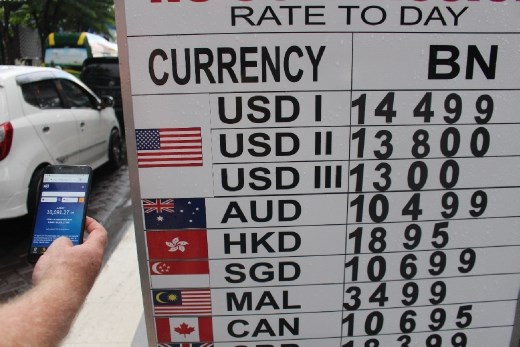Money changers are everywhere in Bali, and seem to dot every corner in Kuta or Legian. Every other business here is, seemingly, either a money changer or a massage joint, each with varying degrees of dubiosity. You don't need a degree in nuclear physics however, to (usually) differentiate legitimate money changers from dubious ones. With a bit of homework and common sense, you'll avoid falling prey to this common scam.
First off, always go to xe.com to check the rate of rupiah versus your home currency. If the advertised exchange rate is better than the official rate, that's a dead giveaway it's dodgy. If you look very closely here, you'll see on my phone that the official rate for $1 AUD is 10,091 rupiah yet the advertised rate here is 10,499 rupiah.

How does the changer make a profit? They rip you off using the sleight-of-hand technique with notes "falling" behind the counter. 500 rupiah doesn't seem like a lot to give away but it adds up to a lot if the person is changing several hundred dollars. A legitimate money changer's rate will be slightly lower than the offical rate.
Secondly, dodgy money changers have a tendency to be down quiet alleys or in the back of shops whereas legitimate money changers often have their own office. Guess which is real and which is dodgy:


The legitimate changer has a nice office with polite and helpful staff whereas the dodgy changer has a cheap wooden desk with little more than a (possibly rigged) calculator. Dodgy changers will often give you 20,000 or 50,000 rupiah notes whereas legit changers will usually give you 100,000 rupiah notes. Furthermore, they will also use techniques to confuse you saying there's some sort of "fee" or whatever. The other day when they tried to rip me off, the changer used his calculator.
You'll often find both legitimate and dodgy money changers right next to each other. Note the Aussie dollar and how my rate that day is 10,091 rupiah to the dollar. The sign in the foreground is a ripoff whereas the one in the background is more legitimate.

It's tempting to impulsively go to the changer that provides a better rate but realize you'll get ripped off. If something is too good to be true then it probably is! The general rule in Bali is to visit the places with the worst rates, avoid places down alleys and in the back of shops, and always be the last to count your money. With these few pointers, the risk of being ripped off is extremely small.
If any of you ever get ripped off by a money changer after reading this article, I don't feel sorry for you!